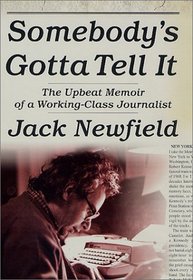Cassian W. reviewed Somebody's Gotta Tell It: The Upbeat Memoir of a Working-Class Journalist on + 47 more book reviews
From Publishers Weekly
New York Post writer Newfield's life story could easily seem like a clichâ: a blue-collar boy grows up in Dodgers-era Brooklyn, attends public school and the tuition-free City University, rallies with civil rights heroes in the 1960s and '70s and slugs his way up the ladder to become a reporter who works for everyman. And though some elitists might dismiss this autobiography as hackneyed, others will be enraptured by Newfield's honest recounting of his worthy contribution to American journalism. In straight-ahead, journalistic prose, Newfield recalls his childhood in New York City, citing experiences that will resonate with many readers: fearing the street gangs that ruled the lunchroom; the enormous impact of Jackie Robinson; reading Murray Kempton's columns on Martin Luther King Jr. in the then-liberal New York Post. Newfield then moves on to his college career, explaining why he became a journalist (as it did for Gay Talese and others, it was reading Jimmy Cannon's sentimental pieces in the Post) and describing his mentor, another champion of the underdog, Michael Harrington. Newfield chronicles his experiences with Students for a Democratic Society in the early '60s, regrets his decision not to speak out against the pro-drug stories at the Village Voice, where he wrote for years, and tells readers what it was like to be a 28-year-old writing a biography of Robert Kennedy. Throughout, his wide-eyed enthusiasm prevails, while his conscious understanding of a journalist's responsibility inspires. This memoir serves as a tribute to New Yorkers and reporters alike. Photos not seen by PW. (Apr. 16)Forecast: This will certainly get big play in the Big Apple, where fellow Brooklynites, former '60s activists and persistent liberals will look for it.
Copyright 2002 Cahners Business Information, Inc.
From Library Journal
On the heels of recent books decrying the liberal bias of the media (e.g., Bernard Goldberg's Bias, Regnery, 2001) comes this spirited, unapologetic account of the life and times of one member of that liberal brotherhood. Born and raised in a working-class area of Brooklyn, Newfield never abandoned the neighborhood code of loyalty, fairness, teamwork, and the sanctity of the picket line. An investigative reporter, columnist, and documentary filmmaker, he has never been content merely to report the news. During the 1960s, even after he began writing for the Village Voice, he participated in marches and sit-ins, and he gives a unique insider's view of the turmoil within the leftist ranks. This highly personal memoir helps to explain the motivation behind biased reporting, but its real value lies in the descriptions of Newfield's encounters with some of the most influential newsmakers and journalists of the last 50 years.
New York Post writer Newfield's life story could easily seem like a clichâ: a blue-collar boy grows up in Dodgers-era Brooklyn, attends public school and the tuition-free City University, rallies with civil rights heroes in the 1960s and '70s and slugs his way up the ladder to become a reporter who works for everyman. And though some elitists might dismiss this autobiography as hackneyed, others will be enraptured by Newfield's honest recounting of his worthy contribution to American journalism. In straight-ahead, journalistic prose, Newfield recalls his childhood in New York City, citing experiences that will resonate with many readers: fearing the street gangs that ruled the lunchroom; the enormous impact of Jackie Robinson; reading Murray Kempton's columns on Martin Luther King Jr. in the then-liberal New York Post. Newfield then moves on to his college career, explaining why he became a journalist (as it did for Gay Talese and others, it was reading Jimmy Cannon's sentimental pieces in the Post) and describing his mentor, another champion of the underdog, Michael Harrington. Newfield chronicles his experiences with Students for a Democratic Society in the early '60s, regrets his decision not to speak out against the pro-drug stories at the Village Voice, where he wrote for years, and tells readers what it was like to be a 28-year-old writing a biography of Robert Kennedy. Throughout, his wide-eyed enthusiasm prevails, while his conscious understanding of a journalist's responsibility inspires. This memoir serves as a tribute to New Yorkers and reporters alike. Photos not seen by PW. (Apr. 16)Forecast: This will certainly get big play in the Big Apple, where fellow Brooklynites, former '60s activists and persistent liberals will look for it.
Copyright 2002 Cahners Business Information, Inc.
From Library Journal
On the heels of recent books decrying the liberal bias of the media (e.g., Bernard Goldberg's Bias, Regnery, 2001) comes this spirited, unapologetic account of the life and times of one member of that liberal brotherhood. Born and raised in a working-class area of Brooklyn, Newfield never abandoned the neighborhood code of loyalty, fairness, teamwork, and the sanctity of the picket line. An investigative reporter, columnist, and documentary filmmaker, he has never been content merely to report the news. During the 1960s, even after he began writing for the Village Voice, he participated in marches and sit-ins, and he gives a unique insider's view of the turmoil within the leftist ranks. This highly personal memoir helps to explain the motivation behind biased reporting, but its real value lies in the descriptions of Newfield's encounters with some of the most influential newsmakers and journalists of the last 50 years.




